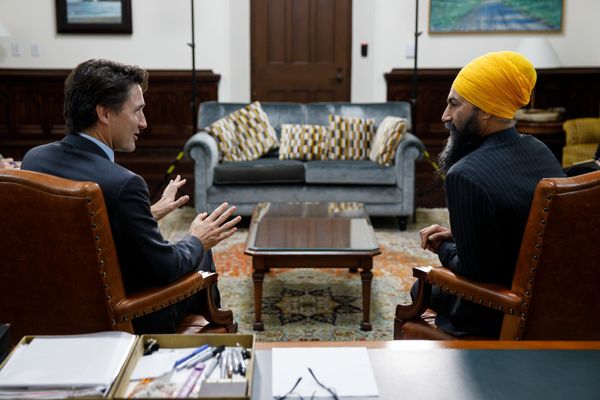Imagine funding the Green New Deal, a Nordic-style welfare state, public housing for all and every other program the left wants without ever raising taxes. This is an attractive idea, and one many proponents of Modern Monetary Theory (MMT) present to the public as a possibility within the framework of their theory.
Thanks to this appeal, MMT has featured prominently in American debates about the economy over the past couple years. Prominent economists like Stephanie Kelton have helped popularize the concept, and it now appears to have made the leap across the border into Canada’s political discourse as well.
An article in The Walrus earlier this month introducing readers to the theory was apparently one of the magazine’s most read pieces. In fact, Canada has been described as an “MMT poster child” by one if its most influential proponents due to our relatively loose constraints on central bank operations.
Unfortunately, MMT is a mirage that ultimately offers little of value and undermines a critical leftist political project: persuading voters of the need for both more government spending and taxation.
What is MMT?
Like most economic theories, there’s no canonical definition for MMT. It’s explained rather differently depending on whether you read its advocates’ academic papers, blog posts, YouTube videos, tweets or popular books.
I’m most interested in how MMT impacts public discourse, so I’ll summarize how it’s usually presented to the public.
The conventional view of how governments spend money is that the government first accumulates money by either taxing, borrowing or creating it. MMT says that this is wrong, and all government spending is in fact financed by money creation.
Here’s one of MMT’s thought leaders, Warren Mosler, making this much clear in his MMT White Paper (written for an American audience):
The US government and its agents, from inception, necessarily spend (or lend) first, only then can taxes be paid or US Treasury securities purchased […] MMT therefore recognizes that it’s not the US government that needs to get dollars to spend, but instead, the driving force is that taxpayers need the US government’s dollars to be able to pay taxes and purchase US Treasury securities.
This raises an obvious question: If governments can create money out of thin air — or with a few keystrokes, as the MMT-ers like to say — then why have taxes at all?
MMT’s answer is that taxation is needed to remove money from the economy in order to reduce demand. When the economy is running at full capacity — full productive employment of people and resources — injecting more money causes inflation. Taxes are needed to prevent this from happening.
Here’s another MMT economist, Randall Wray, explaining this point:
Further, the second reason to have taxes is to reduce aggregate demand. If we look at the United States today, the federal government spending is somewhat over 20 per cent of GDP, while tax revenue is somewhat less—say 17 per cent. The net injection coming from the federal government is thus about 3 per cent of GDP. If we eliminated taxes (and held all else constant) the net injection might rise toward 20 per cent of GDP. That is a huge increase of aggregate demand, and could cause inflation.
This can quickly become a bit of a tangled mess, so let’s summarize briefly what MMT has told us so far: all government spending is financed by money creation, and taxes only exist to prevent inflation caused by that spending.
Modern Monetary Confusion
By itself, there’s nothing wrong with the MMT presentation of how the economy functions, and it does lead to some interesting and substantive conclusions. For example, many MMT-ers argue that Central Banks should set interest rates at 0 per cent permanently and let fiscal authorities manage the price level. But many of these policy conclusions are consistent with non-MMT frameworks as well, as we’re now seeing in a world of zero and near-zero interest rates.
MMT’s main contribution to the public discourse that I can identify is reconfiguring conventional economic language in a way that allows its adherents to make bold-sounding statements that attract political attention, such as:
- “Universal healthcare probably requires lower taxes, not higher”
- “The U.S. government can dramatically increase spending without raising taxes”
- “[The Trump tax cuts] helped without raising inflation, which tells me they didn’t overstimulate, which further tells me there may be room to do even more. Tax Cuts 2.0, anyone?”
A reasonably informed person might read statements like this and come to the conclusion that taxes aren’t needed to fund spending, but once you dig further into MMT you realize this isn’t quite a complete understanding. What’s actually being said is that taxes aren’t needed to fund spending, but instead to offset the inflation caused by spending.
I don’t believe this confusion is accidental. If you read enough of what the MMT crowd say in public, you’ll begin to notice a pattern of downplaying the need for taxes. Their central message is consistent: We don’t need to tax or borrow to fund new spending. What they really mean is we don’t need to tax or borrow to fund new spending under current economic conditions. Taxes, when mentioned at all, are usually an afterthought — something that may be necessary in the distant future to deal with inflation, but not likely to be a short-term concern.
Indeed, one thing MMT-ers will be quick to tell you is that there are a range of other factors — like the pricing power of corporate monopolies and oligopolies — that also drive inflation and could be dealt with before taxes become necessary. If you only read what MMT-ers say in the popular press you might come to believe that the question of tax hikes could be kicked down the road indefinitely.
I have to be fair and re-iterate that MMT doesn’t claim that there are no limits to government spending. But this is how it’s often represented in popular media, and public statements from MMT-ers themselves do little to disabuse people of this impression. On the contrary, their contribution to public discourse has been to convince many people that we can have everything we want without ever having to touch taxes.
We Need More Taxes
Ultimately, questions of who gets what resources will be settled through politics, not technocrats operating a money printer. MMT may rephrase the question, but at some point even MMT-ers admit spending has to be financed through some combination of taxes and borrowing.
The question of how that gets worked out remains open, and the left’s answer has traditionally been straightforward: Resources ought to be distributed in an egalitarian way, with the wealthier paying to fund programs and transfers that disproportionately benefit those with less.
This remains a controversial view, and voters’ aversion to taxation is well known. But this has been, and must continue to be, core to the left’s political project. A story in The New Republic last year underscored for me how much damage MMT can do to that project.
The piece quotes Delman Coates, a senior pastor at Maryland’s Mt. Ennon Baptist Church, telling the Third Modern Monetary Conference that he embraced MMT because, “I don’t want my community to have to wait until we tax Jeff Bezos and Amazon in order for us to have dignified jobs, Medicare for All, and a Green New Deal, or to have our roads and infrastructure rebuilt in America.”
This is an understandable point of view, but the reality is that we do have to be able to tax Bezos and Amazon if we’re ever to have the sort of society we want. Whether you choose to describe the purpose of that taxation as financing spending or offsetting inflation is beside the point.
The path to having things like a Green New Deal or housing for all runs through a political struggle to convince people these are things worth having and paying for. It’s the job of progressive and leftist politicians, thinkers, and movements to do this difficult work and make the case for taxes as a good and necessary thing (because they are).
With their promises of money for nothing and obfuscation on taxation, MMT undermines this project. Telling voters tales about free money may seem like a convenient shortcut, but anyone who takes it to power is bound to disappoint — and in so doing set back the progressive agenda.
We can afford to spend more under current conditions. We can and should run larger deficits and take on more debt to finance spending. But we don’t need MMT to know any of this. Building the society we want will require more spending and higher taxes. The left shouldn’t shy away from saying so, and any economic theory that pretends otherwise is a dead-end.






